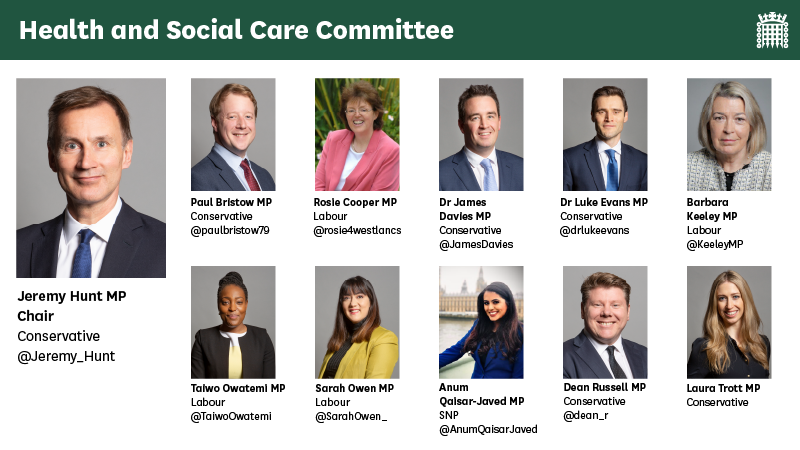How can we tackle staff burnout in the health and care sectors?
Read our recommendations to the Department of Health and Social Care.

How do we define burnout in the workplace?
According to the World Health Organization, workplace burnout is the result of chronic workplace stress that has not been successfully managed. It is characterised by three dimensions:
- feelings of energy depletion or exhaustion;
- increased mental distance from one’s job, or feelings of negativism or cynicism related to one’s job; and
- reduced professional efficacy.
The NHS Staff Survey has suggested that an unacceptably high proportion of NHS staff experience negative impacts as a result of stress in the workplace, and that the proportion of staff suffering from stress is on an upward trend.
"Very simply, stress and burnout at work are when the demands on us exceed the resources that we have."
Workforce burnout was an issue in the NHS and social care workforce long before covid-19 and it needs to be tackled now.
The scale of the problem in the health and care sector

Burnout is a widespread reality in today’s NHS and has negative consequences for the mental health of individual staff, impacting on their colleagues, the patients, and service users they care for.
Burnout rates among NHS staff
44% of respondents to the NHS Staff Survey reported feeling unwell as a result of work-related stress in the last 12 months, compared with 40.3% of respondents to the 2019 survey.
A report published in 2019 by the General Medical Council (GMC) found that in 2018, nearly one in four doctors in training in the UK, and one in five trainers said they felt burnt out to a high or very high degree because of their work.
Burnout rates among care workers
During our inquiry we learnt that, unfortunately, there is no data comparable to the NHS Staff Survey available for social care workers.
The consequences of staff burnout
Burnout not only affects staff but can have an impact on patients and patient safety.
"Staff who are burnt out are at increased risk of error-making and are more likely to suffer from low engagement (lack of vigour, dedication and absorption in work), cynicism, and compassion fatigue."
There are many causes of burnout, but chronic excessive workload is a key driver and must be tackled as a priority. This will not happen until the service has the right number of people, with the right mix of skills across both the NHS and care system.
We ask the Government to:
- Extend the NHS Staff Survey to cover the care sector to understand the scale and impact of workforce burnout on both NHS and care staff.
- Maintain the resources allocated to mental health support for health and care staff when the NHS and social care return to ‘business as usual’ after the pandemic.
Workplace culture

Are health and social care staff supported by workplace culture?
During our inquiry, we heard about the importance of creating a culture across the health and social care sectors where staff feel supported to speak up when they see things going wrong. The National Guardian’s Office (NGO) was established in 2016 to provide a forum for NHS staff and receives non-identifiable information from NHS staff through Freedom to Speak Up Guardians.
There is no equivalent to the Freedom to Speak Up Guardians in the care sector.
Compassionate leadership was also raised during this inquiry as an important factor in encouraging positive workplace cultures:
"We have evidence that shows that organisations where there is more ability for staff to take part in making decisions and influencing how things are decided are the trusts that have lower mortality rates. They have better outcomes generally for patients and better outcomes generally for staff."
The impact of workplace culture on staff from a BAME (Black, Asian and Minority Ethnic) background
During our inquiry we heard about the specific challenges staff from BAME backgrounds faced in relation to workplace culture, burnout and resilience.
Listen to what Lord Adebowale, Chair of NHS Confederation, told us:
The impact of covid-19 on health and care staff burnout

The unprecedented challenges presented by the pandemic worsened existing problems in the workforce.
In June 2020, an NHS Providers survey found that 9 out of 10 trust leaders were concerned about staff wellbeing, stress and burnout following the pandemic.
During our inquiry, we also heard about the human cost of the additional stress placed on health and care staff:
"I signed up to be a doctor. But my family didn’t choose this career path, I feel like I’ve forced the risk on them and I can’t get away from the guilt."
We heard about the pressure and challenges faced by care staff, with self-isolation and quarantine exacerbating absence levels. Care England explained that adult social care staff had also had to take the place of residents “relatives and loved ones”.
The impact on BAME staff
During our inquiry we hard that staff from minority ethnic backgrounds have been disproportionately affected by the pandemic, including in relation to deaths from covid-19.
Dr Chaand Nagpaul, Chair of the BMA Council, told us that over 90% of the doctors who had died during the pandemic came from BAME backgrounds.
It is clear from the evidence collected by Government, the NHS and other organisations that staff from Black, Asian and Minority Ethnic groups have been disproportionately affected by the pandemic in a way that has shone a light on deeply worrying divisions in society.
Workforce planning

At the heart of the solution to workforce burnout and resilience is one simple change, without which the situation is unlikely to improve: the need for better workforce planning.
"The NHS workforce gap in 2020–21 was 115,000 FTE. This is projected to double over the next five years and to exceed 475,000 FTE staff by 2033–34 [...]."
Alongside the figures for the NHS, the Health Foundation and the Institute for Fiscal Studies projected that 458,000 additional FTE [Full-Time Equivalent] social care staff would be required in England by 2033–34.
The NHS People Plan
In July 2020, NHS England and Improvement published "We are the NHS: People Plan 2020–21". According to the plan, employers across the NHS should:
- Invest in physical health and wellbeing
- Make flexible working a priority
- Create an inclusive and diverse workplace
- Maximise opportunities for multi-professional working and developing new skills
- Create time and space for education and training
In our report, Delivering core NHS and care services during the pandemic and beyond, published last year, we concluded that there was “no equivalent of the NHS People Plan for the social care workforce".
During our inquiry we heard that the success of the People Plan will depend on the resourcing allocated to address the failings in the culture of the NHS and the needs and wellbeing of its staff. Without adequate funding the laudable aspirations of the People Plan will not become reality.
Our recommendations to the Government

We ask the Government that:
1. Health Education England publish objective, transparent and independently-audited annual reports on workforce projections that cover the next five, ten and twenty years including an assessment of whether sufficient numbers are being trained.
2.Workforce projections cover social care as well as the NHS, given the close links between the two systems.
3.The Department produces a People Plan for social care that is aligned to the ambitions set out in the NHS People Plan.
4.The level of resources allocated to mental health support for health and care staff throughout the pandemic be maintained after the pandemic.
5. NHS England reviews the role of targets across the NHS, to avoid the risk that operational targets inadvertently create a culture that does not prioritise the care of staff and patients.
What's next?

The Government must now respond to our report.
Our report "Workforce burnout and resilience in the NHS and social care" was published on Tuesday 8 June 2021.
Detailed information from our inquiry can be found on our website.
If you’re interested in our work, you can find out more on the Health and Social Care Committee website. You can also follow our work on Twitter.
The Health and Social Care Committee is a cross-party committee of MPs that scrutinises the work of the Department of Health and Social Care and its associated public bodies.
Cover image: Jonathan Borba via Pexels

